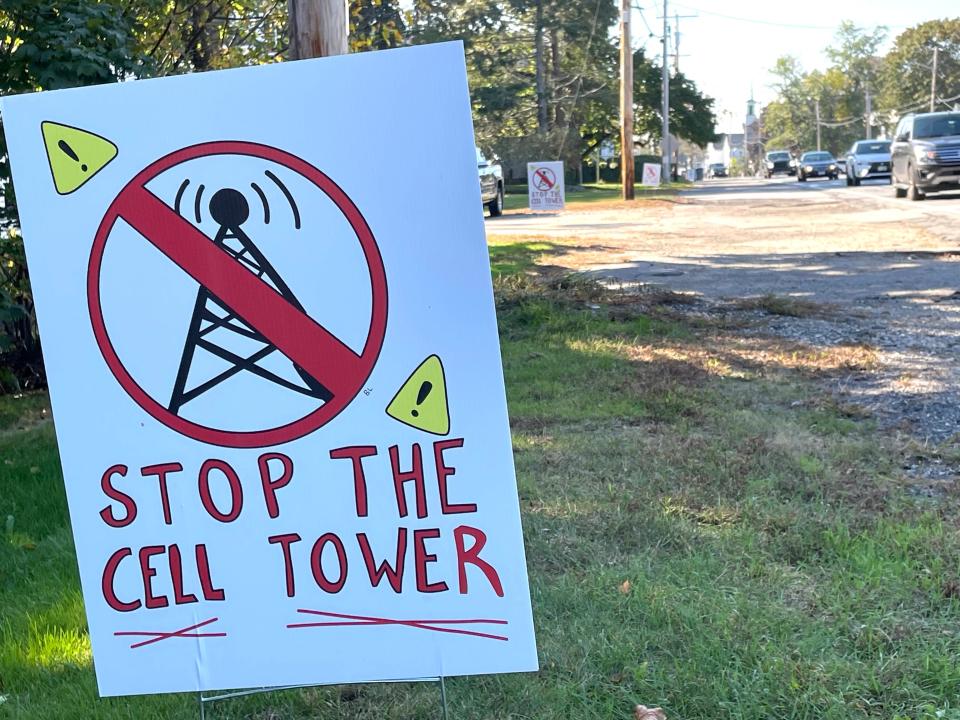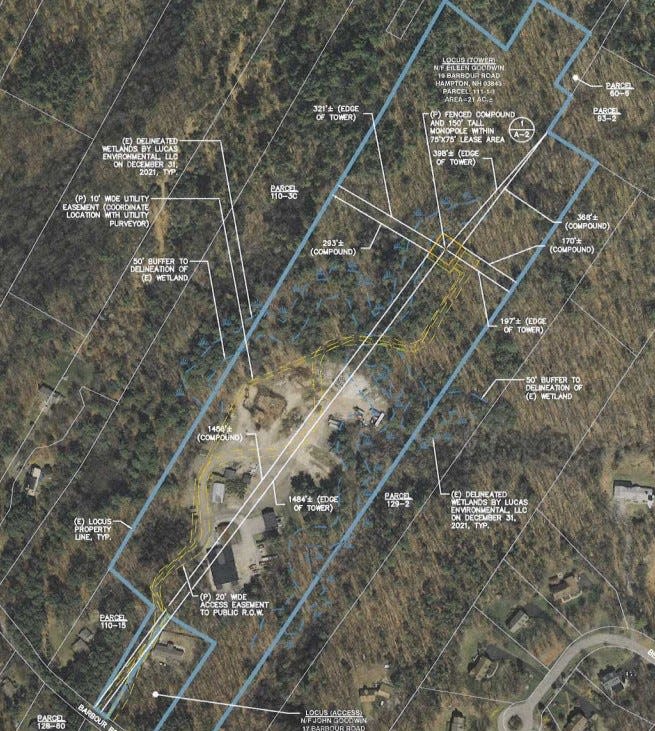Vertex Towers takes Hampton to court over rejected 156-foot cell tower
HAMPTON — Vertex Towers is suing the town’s Zoning Board over its January vote to reject its proposal for a 156-foot cell tower on Barbour Road.
Vertex’s suit filed Feb. 14 alleges the Zoning Board based its decision not on data, but “concerns over the perceived health effects of radio frequency” – a violation of the Telecommunications Act of 1996.
The suit also claims federal law supersedes state laws and local ordinances. It asks a judge to find the Zoning Board’s vote to reject the project “void and invalid.”

The town's Zoning Board voted unanimously Jan. 10 to reject Vertex’s request for variances in height and use. Board members said, during their proceedings, they knew they could not consider concerns over radio frequency emissions per the Telecommunications Act.
Many residents opposed the project out of concern for home values going down and the fear of exposure to radio frequencies. Dolores Mesner, a vocal opponent of the project, disputes Vertex’s claim about how the board reached its decision.
“The board was specific and clear,” Mesner said, “That no health issues were a part of their decision.”
Hampton’s power play: New program aims to slash electric bills for residents, businesses
Vertex sought to build tower to address dead zones
Vertex was looking to build a tower at 17R Barbour Road to service multiple providers and help cover a swath of land in the northern part of Hampton along the east side of Route 1.
Vertex said the project was part of a two-tower solution to address service dead zones. The other tower located in North Hampton nearby was approved last year.
Vertex told the Zoning Board they had an analysis showing the Barbour Road site was the only viable option in Hampton for the tower.

Zoning Board members, however, said they could not grant either variance requested by Vertex. They said they voted to reject the variances because their contracted radio frequency expert told them a shorter 110-foot tower would suffice, and 156-one was not needed. They told Vertex they had not sufficiently demonstrated the tower would not impact property values.
In its lawsuit, Vertex claims the board had no right to deny their project. Vertex attorney William Dodge wrote federal law states a local government “shall not prohibit” personal wireless services without “substantial evidence contained in a written record.”
Dodge argued the board’s reasons did not meet that standard of "substantial evidence." He wrote in the suit the board’s decision was based on the “erroneous conclusion” that a 110-foot tower at the property would suffice to accommodate multiple personal wireless services.
He wrote Vertex had demonstrated to the board that constructing a tower lower than 150 feet would compromise the integrity of radio frequency signals. That would render the tower “incapable of handling multiple facilities,” he wrote.
Meanwhile, the suit states the board received “substantial” testimony from the public about concerns over “alleged health effects.” Dodge wrote that given a lack of evidence the tower would be visible from properties, the board’s concern for the project must have been related to health.
“The board’s denial was an unmistakable, unequivocal reference to the environmental effects of RF emissions,” Dodge wrote.
Vertex is asking a judge to find the board’s decision “void and invalid.” They ask the judge to direct the board to grant the application approving the tower by issuing the requested variances. They also ask the town to be required to grant all other permits and approvals necessary.
More: Hampton couple ordered to pay neighbor $18K in damages due to rogue goats, sheep
Residents await town response to lawsuit
The Vertex cell tower project drew opposition from a large group of residents in town who mounted a campaign against the proposal. They posted signs around town showing a hand-drawn, color picture of a red “cancel” sign over a cell tower.
Opponents of the project packed every meeting held by the Zoning Board on Vertex’s application. They spoke about health concerns and property values during public comment but also argued the cell tower was against zoning because it was in a residential area.
Zoning Board members knew they were likely to be taken to court by Vertex if they rejected the proposal. Vertex had previously sued the town of York’s Board of Appeals over their rejection of a tower project. That suit was withdrawn without prejudice after a federal magistrate judge recommended the suit be dismissed.
Mesner said she is surprised by Vertex’s strategy, as she believed it was clear the reasons why the board denied its application. She fears a lawsuit will be expensive for the town.
“I fear the lawsuit might have an undue financial burden on the taxpayers of the town,” Mesner said, “And a possibility of the court overturning a just and wise decision by the Zoning Board.”
This article originally appeared on Portsmouth Herald: Vertex takes Hampton NH to court over rejected 156-foot cell tower

